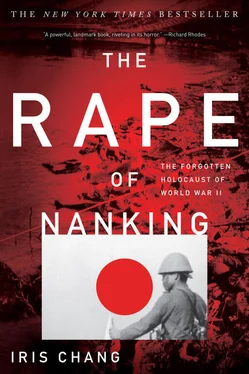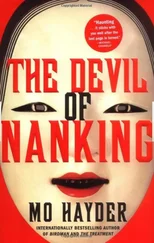There seemed to be no limit to the Japanese capacity for human degradation and sexual perversion in Nanking. Just as some soldiers invented killing contests to break the monotony of murder, so did some invent games of recreational rape and torture when wearied by the glut of sex.
Perhaps one of the most brutal forms of Japanese entertainment was the impalement of vaginas. In the streets of Nanking, corpses of women lay with their legs splayed open, their orifices pierced by wooden rods, twigs, and weeds. It is painful, almost mind-numbing, to contemplate some of the other objects that were used to torment the Nanking women, who suffered almost unendurable ordeals. For instance, one Japanese soldier who raped a young woman thrust a beer bottle into her and shot her. Another rape victim was found with a golf stick rammed into her. And on December 22, in a neighborhood near the gate of Tongjimen, the Japanese raped a barber’s wife and then stuck a firecracker in her vagina. It blew up and killed her.
But not all of the victims were women. Chinese men were often sodomized or forced to perform a variety of repulsive sexual acts in front of laughing Japanese soldiers. At least one Chinese man was murdered because he refused to commit necrophilia with the corpse of a woman in the snow. The Japanese also delighted in trying to coerce men who had taken lifetime vows of celibacy to engage in sexual intercourse. A Chinese woman had tried to disguise herself as a man to pass through one of the gates of Nanking, but Japanese guards, who systematically searched all passing pedestrians by groping at their crotches, discovered her true sex. Gang rape followed, at which time a Buddhist monk had the misfortune to venture near the scene. The Japanese tried to force him to have sex with the woman they had just raped. When the monk protested, they castrated him, causing the poor man to bleed to death.
Some of the most sordid instances of sexual torture involved the degradation of entire families. The Japanese drew sadistic pleasure in forcing Chinese men to commit incest—fathers to rape their own daughters, brothers their sisters, sons their mothers. Guo Qi, a Chinese battalion commander stranded in Nanking for three months after the city fell, saw or heard of at least four or five instances in which the Japanese ordered sons to rape their mothers; those who refused were killed on the spot. His report is substantiated by the testimony of a German diplomat, who reported that one Chinese man who refused to rape his own mother was killed with saber strokes and that his mother committed suicide shortly afterwards.
Some families openly embraced death rather than participate in their own destruction. One such family was crossing the Yangtze River when two Japanese soldiers stopped them and demanded an inspection. Upon seeing the young women and girls in the boat, the soldiers raped them right in front of their parents and husbands. This was horrifying enough, but what the soldiers demanded next of the family devastated them. The soldiers wanted the old man of the family to rape the women as well. Rather than obey, the entire family jumped into the river and drowned.
Once women were caught by Japanese soldiers, there was little hope for them, for most were killed immediately after rape.
But not all women submitted easily. Many were able to hide from the Japanese for months—in fuel stacks, under piles of grass or straw, in pig pens, on boats, in deserted houses. In the countryside women hid in covered holes in the earth—holes that Japanese soldiers tried to discover by stamping on the ground. One Buddhist nun and a little girl avoided rape and murder because they lay still in a ditch filled with bodies and feigned death for five days.
Women eluded rape using a variety of methods. Some used disguise—rubbing soot on their faces to appear old and diseased or shaving their heads to pass themselves off as men. (One clever young woman disguised herself as an old woman, hobbling about on a cane and even borrowing a little boy of six to carry on her back until she safely entered the Safety Zone at Ginling College.) Others feigned sickness, such as the woman who told Japanese soldiers she had given birth to a dead child four days before. Another woman took the advice of a Chinese captive to force her finger down her throat and vomit several times. (Her Japanese captors hastily expelled her from the building.) Some escaped by sheer quickness, ducking in and out of crowds, climbing over walls, with the Japanese in hot pursuit. One girl barely avoided assault by tripping up a Japanese soldier on the third floor of a house and sliding down a bamboo pole that a Chinese man propped up for her from the garden.
Once caught, women who struggled faced the possibility of torture as a warning to others who dared to resist the Japanese. Those who defied the Japanese were often found later with their eyes torn out, or their noses, ears, or breasts cut off. Few women dared fight their assailants, but there were scattered accounts of resistance. A schoolteacher gunned down five Japanese soldiers before being shot to death. The most famous story involves Li Xouying, a woman who not only suffered thirty-seven bayonet wounds during her struggle against the Japanese but survived and remained robust enough to narrate and play-act the story almost sixty years later.
In 1937, eighteen-year-old Li Xouying was the bride of a military technician. When the government evacuated the capital, her husband left Nanking on the top of a train packed with Chinese soldiers. Li stayed behind because she was six to seven months pregnant and believed it was dangerous in her condition to board a crowded train.
Like many other Chinese civilians in Nanking, Li and her father fled into the foreign-run Safety Zone. They hid in the basement of an elementary school that had been converted into a refugee camp. But this camp, like others in the zone, was subject to repeated Japanese inspections and invasions. On December 18, a group of Japanese soldiers broke in and dragged the young men out of the school. The following morning they returned for the women. Fearful of what the Japanese would do to a pregnant housewife, Li made an impulsive decision. She tried to kill herself by slamming her head against the basement wall.
When she regained consciousness, she found herself lying on a small canvas cot on the floor of the basement. The Japanese were gone, but they had taken several young women with them. Wild thoughts raced through Li’s head while she lay in a daze on the cot. If she ran out of the building, she might be throwing herself at Japanese rapists. But if she did nothing and waited, they would probably come back for her. Li decided to stay. If the Japanese did not return, all would be well and good, but if they did, she would fight them to the death. She would rather die, she told herself, than be raped by the Japanese.
Soon she heard the heavy footsteps of three Japanese soldiers coming down the stairs. Two of them seized a couple of women and dragged them screaming out of the room. The one who remained eyed Li intently as she lay immobile on the cot. Someone told him Li was sick, and he responded by kicking all the other people out of the room into the corridor.
Slowly the soldier walked back and forth, appraising her. Suddenly—before he quite realized what was happening—she made her move. She jumped from the cot, snatched his bayonet from his belt and flung her back against the wall. “He panicked,” Li recalled. “He never thought a woman would fight back.” He seized her wrist that held the bayonet, but Li clutched his collar with her free hand and bit his arms with all her might. Even though the soldier wore full battle gear and Li wore only a cotton chipao, which impeded movement, she put up a good fight. The two of them grappled and kicked until the soldier found himself overwhelmed and screamed for help.
Читать дальше











